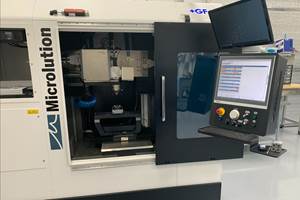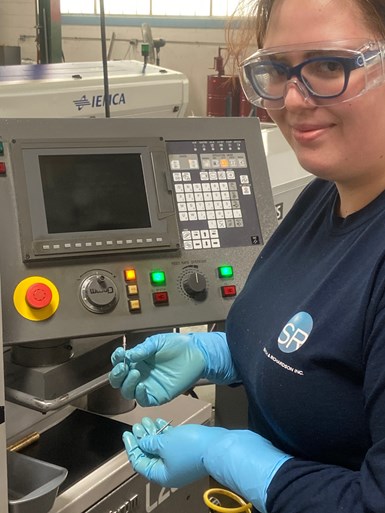
Cynthia Campos is a Smith and Richardson employee who is stepping up to support the shop’s need to boost production of ventilator valve components. (Photo courtesy of Smith and Richardson)
At some point, every precision machine shop is approached by a customer with a “hot job,” one that needs to be turned ASAP. In March, many shops began making accommodations for what might have been the most important hot jobs they’ll ever take on: machining much-needed components for ventilators and other medical devices to help combat the COVID-19 pandemic.
As impressive as their fast response was, so, too, was the coming together as a machining community to immediately react to the needs of their customers. And how they were similarly sensitive to the needs of their employees in the process.
In late March, I contacted Rich Hoster, president of Smith and Richardson in Geneva, Illinois. The contract shop was asked to increase production of six components it machines for ventilator valves. Mr. Hoster says that prior to receiving these customer requests, the company noted the effect the virus was having on the economy and its operation. It began limiting work hours for most employees it refers to as “team members” to 40 hours per week amid concerns that customers would start curtailing orders. The company also started providing daily updates to all employees about changing conditions. Because it also has an operation in China, it had a first-hand look at this situation and, thus, had been dealing with the virus’ effect on that business as far back as late January.
Once Smith and Richardson received the emergency orders for ventilator valve components, it began to contact its customers to reschedule their orders so that the six components could run across six different machines. “All were very understanding,” Mr. Hoster says.
The company put its team on overtime and continued to communicate the need for everyone to remain healthy so that part production could continue uninterrupted. Those who were not feeling well were required to stay home and use their sick days. (The company also offers PTO.) To help team members with children whose schools were closing, the company paid for child care for those who did not currently have it, so they could keep working and not need to worry about it.
In addition, Mr. Hoster reached out to numerous Illinois elected officials, such as Senator Dick Durbin, Senator Tammy Duckworth, Representative Lauren Underwood, Governor J.B. Pritzker and State Senator Don Dewitte, as well as his local mayor and police department to make sure that all were in support of the company producing these parts if a statewide shutdown was ordered. “All were very accommodating and worked to make sure that we would be able to continue to manufacture these parts,” Mr. Hoster says.
He notes that those at the Franklin Partnership, as well as Mark Denzler at the Illinois Manufacturers’ Association, worked hard to educate all elected officials on the necessity of these parts. In addition, he says those at the Precision Machined Products Association (PMPA) were a great conduit of information and provided it daily. Smith and Richardson created a questionnaire for any critical visitors to the plant that determined their ability to access the facility and has now started taking all team members’ temperatures daily.
Those at the PMPA were a great conduit of information and provided it to our team daily. — Rich Hoster
In fact, the PMPA shared part prints for 39 much-needed ventilator parts with its members, asking if they have the capability, time and resources to produce any or all of these parts. Many took on these jobs. The PMPA also made a list of all the member shops capable of mobilizing to make ventilator parts and submitted it to GM, FEMA and other known ventilator producers so that the companies that need the parts to build the ventilators know where to get them.
“Our industry came together to share our capability and capacity to produce these critically needed ventilator parts,” says Cate Smith, PMPA’s executive director.
Further extending its contributions to battling the coronavirus crisis, PMPA has assembled and continually updates a thorough compilation of COVID-19 resources to help shops stay on top of the latest related safety guidelines, regulations and employee support ideas. The site is broken down by state to help navigate to the documents most pertinent to a shop’s needs.
Culture, Communication, Technology
During a webinar in April hosted by MachineMetrics, provider of machine monitoring and analytics solutions, principals from three other shops similarly described their experiences. What they shared showed that successful navigation of this unprecedented situation came down to shop culture, communication and technology.
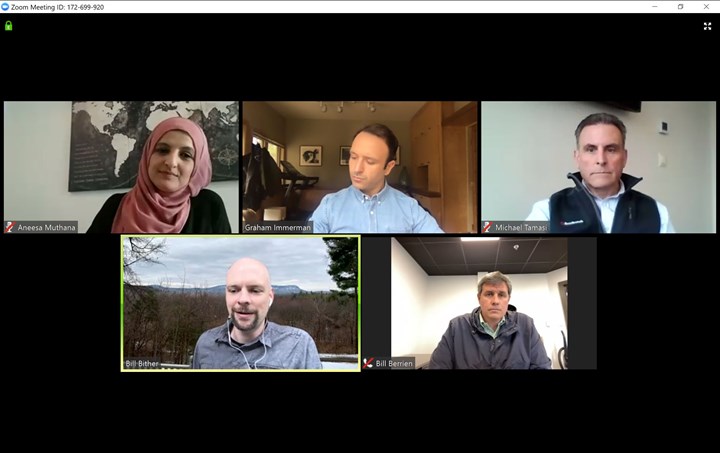
A webinar hosted by MachineMetrics included three shop principals — Aneesa Muthana, Michael Tamasi and Bill Berrien — who shared their experiences satisfying the needs of their customers and employees.
Aneesa Muthana, president and co-owner of Pioneer Service, who I spoke with the day prior to the webinar, says her shop has lost business in some areas and gained in others. Two of her Addison, Illinois, shop’s customers in the electric vehicle industry put a hold on their orders. However, seven customers sent the shop “essential business” letters minutes after the “stay-at-home” order from Governor Pritzker. “We knew we made parts for ventilators and other medical devices, but that has expanded drastically in the past few weeks,” she explains. “A customer that makes valves for stretchers is ramping up, and we’ve submitted our bid on a new project at a volume of 400,000 pieces for two part numbers. This is in addition to the parts we’re already making for them.” In addition, a customer that manufacturers products for biomedical testing reached out to her personally asking for our support, and the shop shipped three months’ worth of releases in one week alone.
Pioneer Service has purchased $7 million in equipment over the last six years. “There is so much standardization these days in terms of high technology, processes, training and tooling that the switch to different work isn’t as bad as would have been years ago,” Ms. Muthana says.
Now is the time for employers to shine. — Aneesa Muthana
The shop’s precision machine tools can be used to make virtually any part that fits in them. So, any change to a new type of part wasn’t really a pivot, but more of a ramping up to higher production volumes. The challenge came with staffing levels as the shop dealt with employees’ specific needs.
With schools facing shutdowns, Ms. Muthana personally reached out to every employee with children to find out if they needed to adjust their work schedule. She even set up the shop’s cafeteria with laptops and coloring books in case parents chose to bring their children to the shop. Some did that until they found child care services.
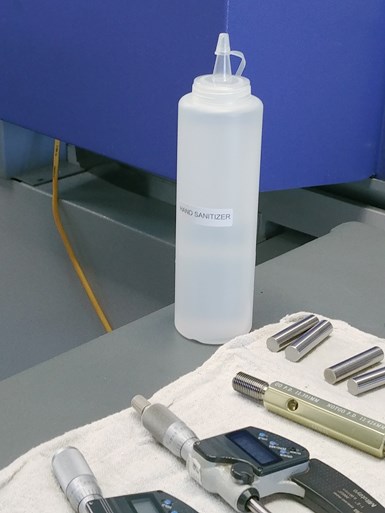
These days, individual bottles for hand sanitizer are as commonplace as hand tools and gages. (Photo courtesy of Pioneer Service)
Michael Tamasi, president and CEO of AccuRounds in Avon, Massachusetts, says his shop was impacted in a different way. At the onset of the pandemic, it was in the pipeline to machine ventilator parts, but wasn’t yet making them. Instead, the shop saw an increase in business from customers making centrifuges and related devices for vaccine production.
This required quick acceleration of existing processes despite having 10% of the shop’s at-risk employees away. Mr. Tamasi says this meant the shop had to take a careful look at its production schedule and match that work with those employees the shop had on site. Effective communication between sales, engineering and production departments was also vital to ensure all jobs are processed properly.
We must be very flexible with all this. — Michael Tamasi
AccuRounds typically runs two shifts each day covering 18 hours. However, “We’ve opened shop to run 24/7 so we can accommodate any team members who would want to work more hours or come in on the weekends,” Mr. Tamasi says. “Some might also choose to come in when there are fewer people in the shop just for increased safety and distancing.” The shop also has split lunch breaks into three separate smaller groups to minimize close employee interaction. “We must be very flexible with all this.”
It has also worked to enhance communication, not only with regard to what’s happening inside the shop but outside as well. Mr. Tamasi, who co-chairs the Massachusetts Manufacturing Emergency Response Team, believes it is important to keep employees abreast of outside forces that can impact the shop in one way or another.
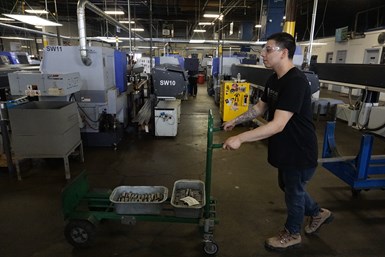
Pioneer Service’s Carlos Perez helps speed delivery of parts to the shop’s customers. (Photo courtesy of Pioneer Service)
Bill Berrien, CEO and owner of Milwaukee’s Pindel Global Precision, says his company’s introduction to ventilators came on the afternoon of March 20 when it received purchase orders for five ventilator parts. The shop was able to ramp up with those new jobs and begin shipping at the customer’s requested volume levels in one week. “The solution is all about speed,” he explains. “It’s looking at your entire manufacturing process, from receiving order to making parts to delivering the parts, and attacking it as aggressively as a machining operation.”
The solution is all about speed. — Bill Berrien
Mr. Berrien, a former Navy SEAL commander, likens advanced manufacturing to the military because both require highly trained, cohesive teams. “It’s not about central command or control when reacting to a crisis situation,” he says. “Instead, you must ensure your employees understand the objectives and goals and then let them individually problem solve to get there.”
It is also important to understand there is only so much one can control, Mr. Berrien notes. “The leadership mantra I share is ‘be where you are.’ Do what you can and make peace with the rest. Appreciate this situation for the different reality that it is, knowing it’s going to be fleeting. Make peace with it, but also appreciate the different perspective it might offer.”
Related Content
Where Micro-Laser Machining Is the Focus
A company that was once a consulting firm has become a successful micro-laser machine shop producing complex parts and features that most traditional CNC shops cannot machine.
Read MoreLaser Technology "Turns" into a Turning Tool
This new technology uses a laser to act as a cutting tool to "turn" parts from solid barstock. This high-speed precision turning machine is especially useful for micromachining, enabling high accuracy for small, complex parts that are often delicate and difficult to machine when implementing conventional turning processes.
Read MoreThe Value of Picosecond IR Laser Marking for Medical
Medical device manufacturers are the primary market for infrared laser markers that deliver pulses in picoseconds to deliver true-black, non-reflective marks on surgical instruments and implantables.
Read MoreMoldmaker Finds Value in Swiss-Type Machining
This multifaceted manufacturer has added CNC sliding-headstock turning technology to complement its established mold tooling production and new injection molding capabilities as it continues to pursue complex medical work along a vertically integrated path.
Read MoreRead Next
Video: Adopting Continuous Improvement as Company Culture
Continuous improvement is an ongoing investment into identifying opportunities for boosting efficiency and reducing waste. This article shares advice from machine shop managers to other machine shop managers about continuous improvement plans that have worked for their companies and the benefits they are enjoying as the fruits of their labor.
Read MoreBenefits of Becoming a Certified Women-Owned Business
Certification can provide a competitive edge
Read MoreParts Cleaning Questions Resulting from COVID-19
While companies scramble to change processes practically overnight, they are forced to respond with creativity and flexibility, improving communication with customers and employees along the way.
Read More

















